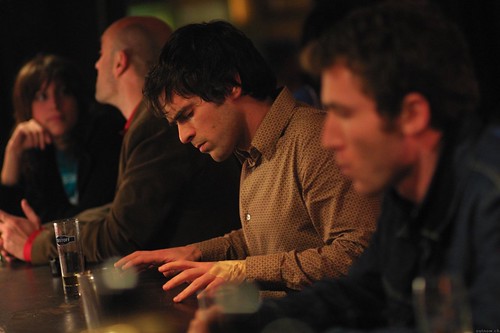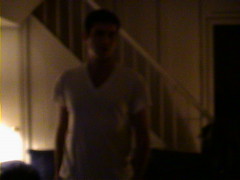Pure Technique

Went to see an film last night called The Beat that my Heart Skipped. French, by a writer/director called Jacques Audiard - it's excellent. Remake of an old Toback/Keitel film from the 70s which I've never managed to sit through - though Toback's version of The Gambler from the same time with James Caan, directed by Karel Reisz, dealing with identical issues is brilliant. The Beat that my Heart Skipped's about a rough young property enforcer, motherless, enduring a difficult relationship with his harsh, manipulative father who tries to find redemption through rediscovering a long-supressed gift at piano playing.
Audiard's one of my favourite directors shooting right now. 56, comes from a film family, did his time writing screenplays inside the French film industry, first started directing about ten years ago with the experimental hit-man film Regarde les hommes tomber. Since then he made three more - A Self Made Hero, Read my Lips and Beat my Heart Skipped - all beautifully made and told. His work's distinctive in the detail of the characters, stunningly intense performances - Kassovitz, Cassel, Emanuelle Devos and Romain Duris are the finest actors of their generation and all have given what must rank among their very finest performances for Audiard - clever yet also elliptical story structures and a kind of close, freeform cinematography style that somehow feels perfectly designed.
Beat that My Heart Skipped sticks with the pattern: it's style is pure intensity. Audiard bears the confidence of deep experience. He begins scenes deep in the action and leaves them well before resolution. He consistently guides the story into directions we do not expect because what we expect is a 3-Act, McKee, lego-block programme that's been insidiously programmed into our mental DNA. Relationships do not deliver the solace they promise, connections are unresolved, vengeances established then only partially delivered, redemptive paths laid out that have no conclusion.
He breaks every rule you will be taught is sacrosanct and he does it with complete confidence and utter success. Why? Becuase Audiard's an artist of consumate technique. And by technique I don't mean that characterless efficiency which the term suggests, but technique as philosophy, state of mind. I mean technique the way Hitchcock referred to it: as a psychologiucal state that guides your every move. Because once you master technique, it becomes instinct and an artist's instinct is everything he or she has. Audiard doesn't short-circuit the entire throughline of his story because he wants to be conceptual, or because he wants to be clever - he does it because it feels right. And he's good enough to make it work. Instinctually, he knows he can do it. It's the arrogance of pure mastery: every great artist has it. That's the definition of great art - certain people were arrogant enough and good enough to break rules everyone else said couldn't be touched.
It's Picasso deconstructing the nude to a geometric hailstorm.
It's Eisenstein cutting out of time.
It's Hunter Thompson seeing Las Vegas.
It's Caravaggio leaving swathes of his Resurrection of Lazarusunfinished with the barest ghostlike sketches of people - because he's good enough. Other artists couldn't pull it off. Caravaggio can. He's a better fucking draughtsman than any of them - a few strokes, some pigment & it'll work. He knows it. Caravaggio was a psychotic drunkard with some kind of personality disorder and he was on the run from the police. He didn't sit down and think Lazarus through with an instruction book at his lap and an assistant advising him - he painted that thing the way he knew it needed to be painted. And he knew - always knew - that it would blow everything else out of the water.
No structured thought, no cleverness - just a kind of rage & boredom with what everyone else is doing and telling you to do, an urge to freedom, pure instinctive mastery. And the knowledge you've got it down.
Not saying Audiard's in Caravaggio's league - but he's good. Better than most other people claiming to tell stories with cameras these days. And he shoots with pure technique - state of mind, a way of thought. An artist's effortless response to the world around them.


<< Home